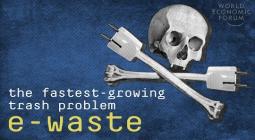This Year's E-Waste to Outweigh Great Wall of China

2021's mountain of waste didn't grow out of nowhere.
October 14th is International E-Waste Day, and, to raise awareness about this growing problem, the waste electrical and electronic equipment forum, or WEEE Forum, has published an alarming statistic.
In 2021, human beings will discard an estimated 57.4 million tonnes (approximately 63.3 million U.S. tons) of electronic waste. That waste will outweigh the Great Wall of China, the world's heaviest human construction. This is why the WEEE Forum is calling for these items to be repaired or recycled instead of discarded.
"This year's focus for International E-Waste Day is the crucial role each of us has in making circularity a reality for e-products," WEEE Forum Director General Pascal Leroy said in a statement. "This is more important than ever as our Governments go into COP26 to discuss global action to reduce carbon emissions. Every tonne of WEEE recycled avoids around 2 tonnes of CO2 emissions. If we all do the right thing with our e-waste we help to reduce harmful CO2 emissions."
2021's mountain of waste didn't grow out of nowhere. In 2019, humans generated 53.6 million tonnes (approximately 59.1 million tons), up 21 percent from 2014. If nothing changes, that number is supposed to hit 74 million tonnes (approximately 81.6 million tons) by 2030, meaning that e-waste is growing by about three to four percent every year.
WEEE Forum attributes this growth to the growing consumption of electronics, smaller periods between new product releases and limited options for repairing broken items.
One example of this cycle is the development and marketing of cell phones.
"Fast mobile phone development, for example, has led to a market dependency on rapid replacement of older devices," Leroy told BBC News.
In the U.S., around 151 million phones end up in landfills or incinerators every year, which amounts to 416,000 a day, WEEE Forum said. Overall, only 17.4 percent of electronic waste is properly recycled worldwide.
This is a major waste both financially and ecologically.
"A tonne of discarded mobile phones is richer in gold than a tonne of gold ore," Dr. Ruediger Kuehr, director of the UN's Sustainable Cycles (SCYCLE) Programme, said in a statement. "Embedded in 1 million cell phones, for example, are 24 kg of gold, 16,000 kg of copper, 350 kg of silver, and 14 kg of palladium — resources that could be recovered and returned to the production cycle. And if we fail to recycle these materials, new supplies need to be mined, harming the environment."
Recovering these metals from electronic waste would also burn fewer greenhouse gas emissions than mining for new materials.
In honor of International E-Waste Day, the WEEE Forum is calling on individuals to do their part by making sure they dispose of their waste correctly.
"We hope to raise awareness among citizens of the importance of returning electricals that are no longer functioning or are unused," Leroy told Australia's ABC News. "In Europe, one out of seven electricals in the household is sitting in drawers because they are not used or not functioning."
However, industry and policymakers have important roles to play in creating the recycling and repair systems consumers can easily use.
"Consumers want to do the right thing but need to be adequately informed and a convenient infrastructure should be easily available to them so that disposing of e-waste correctly becomes the social norm in communities," Magdalena Charytanowicz of the WEEE Forum said in a statement.
Olivia has been writing on the internet for more than five years and has covered social movements for YES! Magazine and ecological themes for Real Life. For her recent master's in Art and Politics at Goldsmiths, University of London, she completed a creative dissertation imagining sustainable communities surviving in post-climate-change London.
She has lived in New York, Vermont, London, and Seattle, but wherever she lives, she likes to go to the greenest place she can find, take long, meandering walks, and write poems about its wildflowers.
13 October 2021
EcoWatch





